From Silicon Valley secrets to the evolving lives of women in the Middle East, the FIIG Book Club share their favourite financial or other reads for 2018

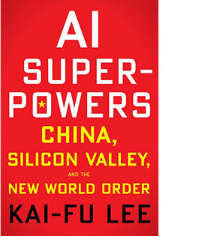 AI Super-Powers: China, Silicon Valley and the New World Order
AI Super-Powers: China, Silicon Valley and the New World Order
By Kai-Fu Lee

In his book “AI Superpowers,” Kai-Fu Lee, argues that China will prove to be a formidable competitor to the United States in AI technology. Kai-Fu Lee was born in Taiwan and studied at Carnegie Mellon in the United States. He is a renowned artificial-intelligence expert, venture capitalist and former president of Google China. His exposure to both China & the United States gives him a unique vantage point to explore the strengths and weaknesses of both nations in their race to be AI super-powers.
Lee acknowledges that the United States has been the first mover in developing AI capabilities with many universities providing thought leadership and several companies proving at an unprecedented scale the transformative power of AI.
Lee warns that this advantage will not last forever, as China is quickly developing its AI capability at mass scale. The AI era will reward “the quantity of solid AI engineers over the quality of elite researchers,” Lee writes. China’s focus is developing an “army” of deeply skilled engineers and entrepreneurs. In addition, they are also creating a supportive environment for this skillset to flourish with “abundant data, tenacious entrepreneurs, well-trained AI scientists, and a supportive policy environment.”
The book also goes into specific details of start-ups and entrepreneurial companies in both China and the US and the factors that made them thrive and which will also in future years aid these two nations to become AI super powers. I recommend reading the full book and would give it a 4/5 rating.
Reviewed by
Nandita Alva, MIPS Product Manager - MIPS
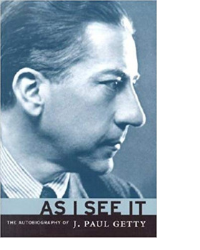 As I See It
As I See It
By J. Paul Getty

On a recent trip to Los Angeles, I visited the Getty Centre following a recommendation from a client. It is a hugely impressive location and the scale of Getty’s art collecting is truly phenomenal. The visit piqued my interest in the man that left this incredible legacy so I picked up his autobiography on my way through the gift shop. Getty was a well-known recluse and whilst plenty had been written about him I was interested to hear his side of the story.
I found the book to be a fascinating read especially when you consider that it was published in 1976, the year that he died. Yes, some of his views are somewhat outdated now, but many more seemed incredibly prescient and could very easily be describing the world we live in today. At one point he lamented that predicament of Italy stating that he was selling all his business interests in the country, which were significant, as Italy was drowning in debt. Little seems to have changed in the intervening c.40 years apart from Italy’s debt growing even higher.
Despite his great wealth, Getty was famous for being very miserly and he articulately counters some of the accusations hurled at him in this area. Particularly in relation to installing a payphone at his stately home Sutton Place in England and his reticence to pay a ransom to secure the release of one of his grandsons who had been kidnapped.
Whilst a recluse in a public sense Getty maintained an incredibly active social life relentlessly dining and partying with royalty and the A List of the day. Of course when reading an autobiography you expect to sympathise with the writer to an extent and this book is no exception especially when he has been so harshly judged by much of the mainstream press. This book covers much more ground than purely focusing on his business interests, I thoroughly enjoyed reading it and would recommend it as a holiday read.
Reviewed by
Darryl Bruce, State Manager - WA
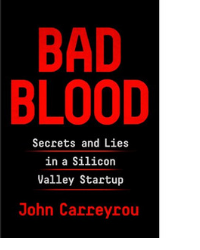 Bad Blood: Secret and Lies in a Silicon Valley Startup
Bad Blood: Secret and Lies in a Silicon Valley Startup
By John Carreyrou

Imagine a revolutionary startup tech company which has invented a product able to test for hundreds of medical disorders.
The new diagnostic device is compact, fast, and inexpensive. It can be operated by the average Joe in their own home. There are no syringes. All that is required is one tiny, pain free drop of blood to simultaneously perform dozens and dozens of tests. Results are produced in minutes.
Prior to this breakthrough, the $100 Billion Medical Diagnostic Industry required several large machines to perform a limited number of expensive tests. Procedures were carried out in hospitals or labs by trained technicians. Patients were forced to endure the pain of having multiple vials of blood drawn by needle only to wait weeks to receive the results.
The company is headquartered in Silicon Valley, an area of only 50 square miles that has created more wealth than any other place in human history. Notable neighbours are some of the most innovative and valuable companies in the world.
The young CEO is a charismatic, entrepreneurial genius said to be the next Steve Jobs or Bill Gates. It has a valuation of $9 billion with seed money of nearly $900 million. It’s backed by a long list of well connected, savvy billionaire investors and VC funds.
Their Board of Directors are called “the envy of Silicon Valley” featuring retired CEO’s from Fortune 500 companies and numerous former senior US Government officials. Partnerships have been inked with some of the world’s largest pharmaceutical companies, various hospitals, health insurance providers and even the US Department of Defense. Finally, the media and Wall Street are swooning over the company and its CEO. Everyone is queuing up to make billions on the most important disruptive medical advancement of the 21st century.
What could possible go wrong?
With two Pulitzer Prizes under his belt Wall Street Journal Reporter John Carreyrou unearths the bizarre truth behind the “fake it until you make it” failure of Theranos and its founding CEO Elizabeth Holmes.
Unless you work in HR or like to invest in ultra-secretive start-ups, Carreyrou’s novel is a great holiday read which would make even Bernie Madoff blush.
Reviewed by
Judd Bogust, Associate – Fixed Income
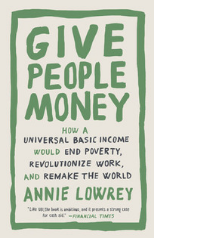 Give People Money
Give People Money
By Annie Lowrey

A book that helped opened my eyes to the economic condition of many of the world’s underprivileged and poor.
The book takes us through stories about individual characters that live a life of struggle with little to no ability to escape. She helps the reader empathize with these individuals that seem stuck in constant poverty and shows us why we should not blame them for their unfortunate circumstances.
The central idea of the book is that inequality will continue to rise in a world where automation and artificial intelligence takes on a larger roll. The method for addressing the pending “jobs and opportunities” armageddon is that of a universal basic income (UBI).
UBI is heralded as remedy for current inequalities between different races, classes and genders. The author Annie Lowrey believes it would also create a sense of inclusion, a chance for each and every poor, disabled and marginalised individual to play an active role in the economy.
To me the book only gave a very limited explanation of how such a scheme would be funded which included tax hikes, robot taxes as well as scrapping other forms of welfare.
I certainly didn’t find this a feel-good read and would not recommend this for the beach or on vacation. My deep inbuilt beliefs of an honest day’s work for an honest day pay also seemed to be questioned which felt a little uneasy at times.
6/10 – tough reading but a great eye opener.
Reviewed by
Ben Taylor, Director – Fixed Income
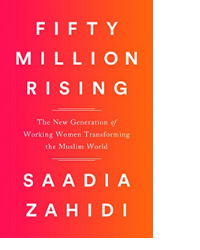 Fifty Million Rising
Fifty Million Rising
By Saadia Zahidi

The author, Sadia Zahidi is Pakistani and a Senior Director for the World Economic Forum.
The book discusses the enormous transition of the Muslim world as women are encouraged to study and work outside the family home. The transition has enormous potential for the countries to increase GDP and economic prosperity. Yet many cultural beliefs prohibit women from entering the workforce and contributing to family income.
When I read a review of the book, it stated that Zahidi had interviewed over 30 women from various countries, which I thought sounded fascinating. In hindsight, the stories were what drew me to the book, but was left wanting more – more details about the women’s lives, more stories about the work they are doing and more by number. While there were stories interwoven into various themes, the book was dominated by many statistics that I sometimes found swimming in my head.
The book was encouraging, but at the same time annoying. The constraints on Muslim women entering the workforce are much the same for western women - juggling childcare, home duties and work as well as the pressure of family and society.
At times the book was heart warming, as some women succeeded despite the general tide against them. For others, it was completely frustrating, for example when Pakistani women studied to become doctors but then used their qualifications to secure good marriages. Forced to stay at home and not allowed to practice despite a desperate shortage of doctors.
One step forward, then two steps back…
Reviewed by
Elizabeth Moran, Director - Education
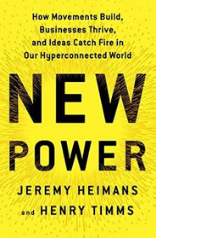 New Power
New Power
By Jeremy Heimans and Henry Timms

I enjoyed the way this book considers how to mobilise people via social media, and therefore how new power works compared to traditional power bases (with decisions in the hands of a few managers).
The book asks the question why are some groups successful at spreading messages so effectively e.g. the ice bucket challenge that went viral or the naming competition for the British vessel which was arguably hijacked, with Boaty McBoatface the clear winner.
The authors also question why some other groups are so unsuccessful in their quest to seem new age, and concludes that many organisations are just paying lip service to their followers, and therefore they are easily seen through and not able to be viewed as generally caring about the thoughts and input of their clients and followers.
The book manages to get the reader to consider how their organisation fits compared to a ‘best practise’ firm that encourages a ‘new power’ approach, genuinely caring about the input of clients and followers. Lego is cited as a best practise example of his where they consult with enthusiasts and would be Lego builders and developers to encourage participation in new models to be built, and even promising a small percentage of the profits.
The main reason I only scored this book a 3, is that much of the text seemed rather theoretical to me and there were a few endorsements of Jeremy Heimans and his company which put me off as that made me feel it was trying to sell his services.
Reviewed by
Leigh Winton, Head of Investment Strategy Group
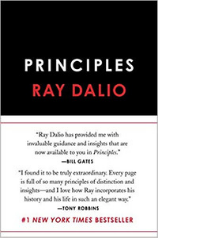 Principles
Principles
By Ray Dalio

When a man with a net worth of $18bn publishes a book outlining in great details the principles by which he built his wealth, you can’t help but be curious. That is exactly what Ray Dalio, the founder of the world’s biggest hedge fund firm, has done in this book describing the principles that made himself as well as Bridgewater itself extremely successful.
Dalio begins the book by providing his personal background, including how he started his firm in 1975 and the rise of Bridgewater. Throughout the book Dahlio provides tools to help achieve your goals, including a five-step process to accomplish what you want in life. Without question, Dalio has a unique perspective from his unconventional management style, his 40+ years of finance experience and his undeniable knack for figuring out ways to make money.
The concept of codifying one’s principles in life is one that really resonated with me and although you may not agree with each one of Dalio's principles, that’s exactly the point he mentions. A lot of the time I did find myself agreeing with him and I especially admired the way Dalio learned from his personal failures to then develop and define his set of personal and professional principles to live and work by and is what in fact led to his (and his hedge fund's) success.This is a strategy book on having clear goals, recognising problems and finding solutions but the inclusion of the autobiographical element is what kept me reading. I particularly admired Dalio’s quest personally and in business to being radically transparent and honest. While not all of Dalio’s life and work principles are necessarily applicable to my life, I walked away creating principles of my own for various aspects of my life following his framework.
Reviewed by
Jenna Labib, Associate Director – Fixed Income
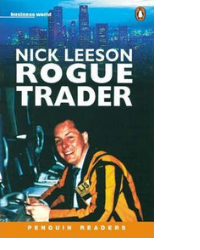 Rogue Trader
Rogue Trader
By Nick Leeson

In 1995 Nick Leeson bought about the collapse of merchant bank Barings while working in its Singapore office on the futures trading floor.
This is his side of the story and version of events. He fancies himself almost as a Robin Hood, covering up the mistakes of his colleagues and hiding them in Error Account 88888. Then trying to trade out of the positions and correct them over the following business days. In the end however, the positions were too big and the market continued to move against him.
It’s a fast paced book of hectic days on the trading floor, late nights creating false entries to hide the errors and a high-flying lifestyle in Singapore. You know it’s just a matter of time before it catches up with Nick.
And it does. Although he isn’t solely responsible, senior management are completely incompetent, and he pays the price in the end.
Reviewed by Jessica Rusit, Associate Director – Investment Strategy Group
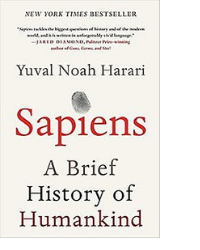 Sapiens: A Brief History of Humankind
Sapiens: A Brief History of Humankind
By Yuval Noah Harris

This is an original and reflective book written by a brilliant historian.
An anthropological journey over 70,000 years providing disarming insights into humans and what we have concocted during our evolution.
Harari’s prose is structured, clever and compelling. It is also thought provoking as we reflect on the past and how we arrived at the present. The great strength of this history of humankind is Harari’s various hypotheses for how and why events and concepts developed. These include agriculture, religion, science, money, exploration, family and capitalism (to name a few).
First published in English (translated from Hebrew) in 2014, Sapiens was recommended to me recently. And I’m glad that it was. A perfect book to read over the holidays.
Reviewed by
Douglas Bates, Chairman – FIIG Securities
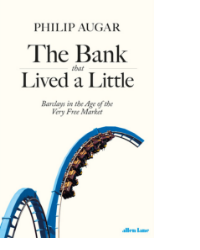 The Bank That Lived A Little
The Bank That Lived A Little
By Philip Augar

From the opportunities that followed the 1986 deregulation of Britain’s’ financial markets to the corporate feud between then CEO Antony Jenkins and Chairman John McFarlane, Philip Augar provides a highly detailed account of one of Britain’s biggest banks, Barclays PLC and the banks’ three decade journey to become a top tier, fully-functional investment bank.
The book also details Barclay’s capture of Lehman Brothers U.S. broker dealer arm in 2008 at a bargain price. Even though the acquisition helped establish Barclays as a major institution on Wall Street through expanding their trading and M&A operations, ultimately it has led to years of poor earnings on these operations, with Barclays’ investment bankers consistently destroying shareholder value.
Reviewed
by Thomas Gosper, Graduate – FIIG Academy
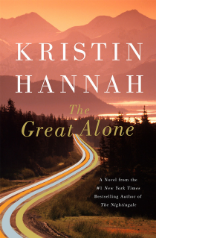 The Great Alone
The Great Alone
By Kristin Hannah

The first novel I read by this author was The Nightingale, an historical fiction, which I thought was outstanding. So when her new novel, The Great Alone was released earlier this year, I couldn’t resist.
Centred around a 13 year old only child, battling poverty, constant upheaval and a broken ex-serviceman father, the book provides many insights.
The struggling family are gifted some land in Alaska and head to a desolate small community to start again. The book is set 48 years ago and while family dynamics will have you on the edge of your seat, so will the description of the frontier and its harsh environment.
Reviewed by
Elizabeth Moran, Director – Education
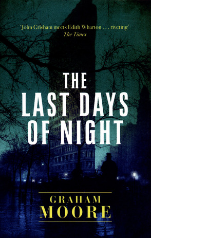 The Last Days of Night
The Last Days of Night
By Graham Moore

A fantastic premise of fictionalising one of the great struggles in the modern industrial story, that of the electrification of the country, it lays bare one of the issues at the heart of America – the great thought experiment of “Life, Liberty and the pursuit of Happyness” and how it has been subsumed by the commercial interest, and tellingly, that a lawyer is at the heart of the tension between the purity of invention and the requirement (read greed) to turn a profit. The book starts slowly, and doesn’t really pick up pace until the final third, when the threads start to come together and the pace picks up into the conclusion, which is actually a cracking read.
I would give it 4 out of 5 as a rating, mainly because it didn’t grip me from the beginning and I had to persevere, although by the end of it, it was worthwhile, and the Author’s note about the historical reality was actually more fascinating than the story that preceded it.
Reviewed by
Jonathan Sheridan, Head of Private Client Solutions
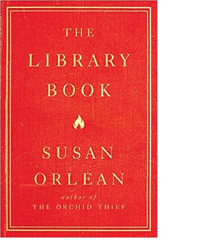 The Library Book
The Library Book
By Susan Orlean

I purchased this novel as I am a native Angelino. I was drawn to its setting around the mysterious 1986 fire which consumed 400,000 books and devastated the Los Angeles Public Library. My father’s law firm and my Prep School were both “Downtown” near the LAPL so I was a regular visitor before and after the fire. Susan Orlean’s vivid style perfectly captures the beauty of the library and the City of Angels. But as the novel unfolds Orlean tells a much bigger story about the evolution of libraries and their vital importance to modern society. If you love reading, buy The Library Book.
Reviewed by
Judd Bogust, Associate – Fixed Income

The Undoing Project
By Michael LewisThe Undoing Project by Michael Lewis. He wrote “the Big Short”, about the GFC, and has just published “The Fifth Risk” about Donald … (you know who). All much better than J Paul Getty.
Here’s to a better year in 2019.
Reviewed by
John Rigg – Client
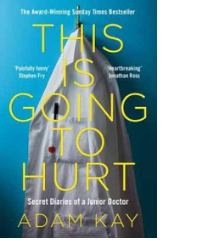 This Is Going To Hurt
This Is Going To Hurt By Adam Kay

This is an honest, witty and at times heartbreaking series of diary entries junior Dr Adam Kay wrote while working for the National Health Service (NHS) in England. Dr Kay had no idea what to expect when he signed up to become a doctor. It involved 97-hour weeks, life and death decisions, and all for very little pay. It’s an eye-opener to the stress and lack of support doctors endure at the NHS, and certainly gives context to a tough day at work!
From his first rota (rotation) in general to specialising in obstetrician and gynaecology, you are there in the ward with each patient he sees to. At moments you’ll squirm with the detail and gore, other times you’ll be close to tears with the reality of the job. It is Dr Kay’s spirited wit and humour that makes it such an enjoyable read, and shows the true resilience the young doctor possesses in some difficult and trying situations.
I found a new level of respect and appreciation for those working in the medical profession and the amazing work that they do.
Reviewed by
Jessica Rusit, Associate Director – Investment Strategy Group